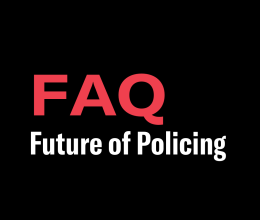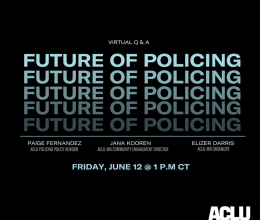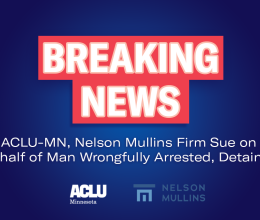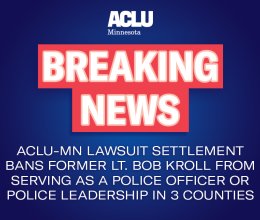
One out of every 1,000 Black men in the United States can expect to be killed by police during their lives. Black, Brown and Indigenous communities are being physically, psychologically, spiritually and economically devastated by over-policing. Police are killing members of those communities at terrifying rates.
Piecemeal reforms have failed to prevent more deaths. Fueled by George Floyd's brutal murder by Minneapolis police, a local and national movement is growing to transform the status quo of modern policing. People are rising up to demand a future with fewer police. The ACLU of Minnesota joins in solidarity with Black-led organizations that are at the helm of this movement.
We present this Q&A to tackle some of the most pressing questions about divesting from the police, and using the savings to re-invest in our communities.
What is the difference between demands to “defund the police” and to “divest from police?”
Whether people frame their demands as “defunding” or “divesting” from police, those within this movement are united in the belief that police are not the right solution to every challenge our communities face. Instead, we want to shrink enormous police budgets — in Minneapolis alone, the police budget is nearly $200 million, or one-third of the city’s total expenditures — and instead fund community services other than police to help solve problems in our neighborhoods.
Did the movement to divest from policing begin in response to the murder of George Floyd?
The movement is not new. It belongs to generations of Black activists who have insisted for decades -- even centuries -- that police are not equivalent to safety, especially for Black, Brown and Indigenous communities. We uplift the leaders of this Black-led movement, like Meriame Kaba, Angela Davis and Ruth Wilson Gilmore, who have paved the way for us to have a serious conversation about divestment, and not simply about more Band-Aid reforms.
In the Twin Cities, we also uplift Black organizers and Black-led organizations like Black Lives Matter in Minneapolis and Saint Paul, along with Black Visions Collective and Reclaim the Block, who are leading the local movement. Their demands are not spontaneous. They are the result of years of organizing and strategic planning, and they have practical plans for the implementation of their vision.
Shouldn’t we try some smaller reforms first, before we jump to divestment?
Let’s face it — we've already tried smaller reforms, and they have not done enough to save Black, Brown and Indigenous lives from being snuffed out by police violence. If they had, George Floyd, Breonna Taylor, Rayshard Brooks, Philando Castile, Jamar Clark and countless others would still be alive. Body cameras, implicit bias training, civilian review boards, and restrictions on police uses of force are not working.
Why? Because the underlying problem with policing isn’t a lack of training, or a lack of accountability, or a lack of good procedures about use of force. It’s the racism at the foundation of modern policing and the associated broadening of the scope and power of law enforcement that leads to so many egregious uses of force against Black, Brown and Indigenous people.
If we cut police budgets, who will answer when I call 911?
Right now in many communities, police departments are the only adequately funded service available to deal with non-criminal situations like homelessness, behavioral issues in schools, mental health crises, “wellness” checks and neighbor disputes. When police respond — especially if the person in question is Black, Brown, Indigenous and/or disabled — they too often respond with violence, leading police to kill the person rather than help them.
It’s pretty simple: We think that when people call 911, operators should be able to dispatch the right person for the problem — not just an officer with a gun. With savings from reduced police budgets, we could fund community-based alternatives such as:
- Mediation and intervention professionals to de-escalate conflict in situations such as neighbor disputes, intimate partner violence and gang violence;
- Psychologists and behavioral health specialists to support children in our schools;
- Existing community-led organizations that are known and trusted by people to provide services, but which currently don’t have the resources to expand their outreach;
- Spaces and facilitators for restorative justice conversations when someone in the community does harm or is harmed.
Budget savings could fund responders who have relationships with the communities they serve and whose professional training prepares them to respond to crisis situations without violence. And they'd do so in ways that affirm the lives and humanity of people in the community.
If we cut police budgets, where will the savings go?
Black, Brown and Indigenous communities suffer from centuries of severe underinvestment in restorative justice, mental health, housing, education, parks, and other social and community services -- services that white neighborhoods often get to take for granted. In too many BIPOC communities, the only services that are widely available and adequately funded are the police and punitive programs.
Those of us calling to divest from police want to end racist policing that hurts our communities. We want to stop funneling all our resources into over-policing, so we can reinvest the money into our communities. This way, we can give more people access to services that are proven to reduce crime and resolve conflict without violence. That means funding things that strengthen communities such as housing, mental health services and educational supports. It also means funding services other than police so that when people need help, they can call a person qualified and trained to solve the problem without further harm.
Will replacing police with community programs and services make me and my family less safe?
Many of us have a distorted idea of how police spend their time. The truth is, policing is not like what is depicted on Law & Order. Officers fail to solve the majority of serious crimes. Arrest data bears this out. Nationally, only 5% of all arrests are for violent crimes — the other 95% are for petty behaviors like drug possession, loitering and driving without a license. In Minneapolis, like many places, police have a poor track record at solving even the violent crime that does occur, clearing only 22% of rapes and 56% of homicides in 2019.
To reimagine policing, many of us first need to reimagine safety and where it comes from. That means decriminalizing many currently criminalized behaviors that do not cause harm to others. It also means diverting resources to non-punitive interventions like restorative justice when harm is done. Not only would this approach reduce or eliminate dangerous interactions with police, it would also free up time for police to do their jobs: investigating and solving violent felony crimes.
How will divestment from police impact daily life in white communities where there is not a large police presence?
One of the beauties of the movement to divest from policing is that we already have a model for how this would look: middle class and wealthy white communities. People living in these areas don’t fear police violence because, even though white people engage in criminalized behavior at about the same rate as Black people, white people’s neighborhoods aren't over-policed. That means they will have far fewer police interactions over their lifetimes. If white people do interact with police, they are more likely to receive the benefit of the doubt and less likely to be perceived as threatening. When people in wealthy white neighborhoods experience conflict or cause harm, there are often non-punitive services available to divert them away from police intervention and incarceration.
Shrinking the role that police play in our daily lives won’t change the status quo in middle class and wealthy white communities. It will simply extend those norms to everyone else.
Will divesting from policing cause crime to increase?
No. Multiple studies show that increased rates of policing and incarceration do not have an impact on crime. In some places like New York City, scalebacks of policing and arrests have been correlated with lower rates of crime. Here’s the thing — police spend a great deal of time over-policing Black, Brown and Indigenous communities and punishing people who engage in criminalized behavior, but they are not great at preventing or solving crimes. Nationally, about 95% of all arrests are for petty behaviors like jaywalking, loitering, drug possession and driving with a suspended license — criminalized behaviors that don’t harm others in the community. Meanwhile, last year in Minneapolis, police solved 56% of homicides and just 22% of reported rapes, even as they padded their budget and put more officers on the streets.
While these low-level arrests don’t make anyone any safer, they do extract incredible amounts of revenue from over-policed Black, Brown and Indigenous neighborhoods. Over-policing and other exploitative policies governing fines and civil forfeiture allow police departments to strip wealth from these communities on a massive scale and weaponize those resources against the people. That makes many of us less safe, because each police interaction creates another opportunity for one of our neighbors or family members to be killed by police.
Can the Minneapolis City Council really dismantle the Minneapolis Police Department?
Yes, but with a caveat. Right now, the Minneapolis city charter dictates a ratio of police officers to residents. This city-charter mandated ratio prevents the City Council from taking any action that dramatically reduces the size of the police force -- something experts and activists alike see as essential to creating the opportunity for deep, systemic change.
The Minneapolis city charter can only be changed by a unanimous vote of the council and the mayor, and some of those parties remain opposed. That leaves two options: The Council can decide to cut other parts of the police budget, or voters can decide to reduce the number of officers through a ballot amendment.



